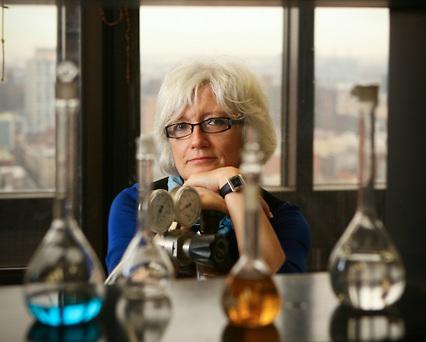
A team led by pioneering CCNY chemical engineer Teresa Bandosz develops smart textiles with the ability to detect and neutralize nerve gas.
From the lab of City College of New York chemical engineer and Fulbright Scholar Teresa J. Bandosz comes a groundbreaking development with the potential to thwart chemical warfare agents: smart textiles with the ability to rapidly detect and neutralize nerve gas.
The fabric consists of a cotton support modified with Cu-BTC MOF/oxidized graphitic carbon nitride composites. The latter were developed in the lab previously and tested as nerve agent detoxification media and colorimetric detectors.
Combining Cu-BTC and g-C3N4-ox resulted in a nanocomposite (MOFgCNox) of heterogeneous porosity and chemistry. Upon the deposition of MOFgCNox onto cotton textiles, a stable fabric with supreme photocatalytic detoxification ability towards the nerve gas surrogate, dimethyl chlorophosphate, was obtained.
The detoxification process was accompanied by a visible and gradual color change, which Bandosz said can be used for the selective detection of chemical warfare agents and for monitoring their penetration inside a protective layer.
“These smart textiles adsorbed almost 7g of CWA surrogate/its detoxification products per gram of Cu. The superior performance was linked to the high dispersion of the MOF crystals on the fibers, and a specific texture promoting the availability of the active copper centers,” said Bandosz, who is seeking funding for additional research.
Her research team included Dimitrios A. Giannakoudakis, a PhD student; Yuping Hu, visiting scientist from China; and postdoctoral research associate, Marc Florent. Their study appears in the journal Nanoscale Horizons.
Bandosz received a 2016-2017 Fulbright Senior Scholar Award for her pioneering work. She did research at the University of Malaga in Spain to help alleviate global warming and solve energy problems.
About The City College of New York
Since 1847, The City College of New York has provided low-cost, high-quality education for New Yorkers in a wide variety of disciplines. Today more than 16,000 students pursue undergraduate and graduate degrees in eight professional schools and divisions, driven by significant funded research, creativity and scholarship. Now celebrating its 170th anniversary, CCNY is as diverse, dynamic and visionary as New York City itself. View CCNY Media Kit.